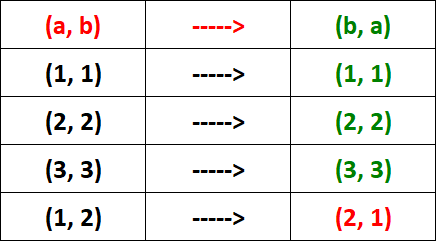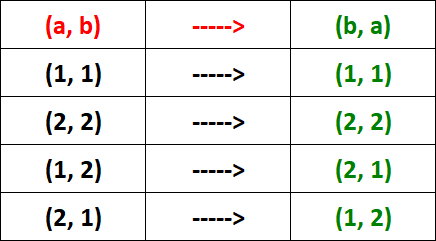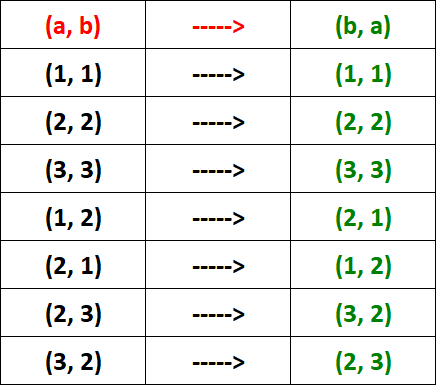SYMMETRIC RELATION
Subscribe to our ▶️ YouTube channel 🔴 for the latest videos, updates, and tips.
Let R be a relation defined on the set A.
If R is symmetric relation, then
R = {(a, b), (b, a) / for all a, b ∈ A}
That is, if "a" is related to "b", then "b" has to be related to "a" for all "a" and "b" belonging to A.
In simple terms,
a R b -----> b R a
Example :
Let A be the set of two male children in a family and R be a relation defined on set A as
R = "is brother of".
Verify whether R is symmetric.
Solution :
Let a, b ∈ A.
If "a" is brother of "b", then "b" has to be brother of "a".
Clearly,
R = {(a, b), (b, a)}
So, R is symmetric.
Solved Problems
Problem 1 :
Let A = {1, 2, 3} and R be a relation defined on set A as
R = {(1, 1), (2, 2), (3, 3), (1, 2)}
Verify R is symmetric.
Solution :
To verify whether R is symmetric, we have to check the condition given below for each ordered pair in R.
That is,
(a, b) -----> (b, a)
Let's check the above condition for each ordered pair in R.

From the table above, if R is symmetric, for the ordered pair (1, 2), we must have (2, 1) in R.
But, we don't have (2, 1) in R.
So, R is not symmetric.
Problem 2 :
Let A = {1, 2, 3} and R be a relation defined on set A as
R = {(1, 1), (2, 2), (1, 2), (2, 1)}
Verify R is symmetric.
Solution :
To verify whether R is transitive, we have to check the condition given below for each ordered pair in R.
That is,
(a, b) -----> (b, a)
Let's check the above condition for each ordered pair in R.

From the table above, it is clear that R is symmetric.
Problem 3 :
Let A = {1, 2, 3} and R be a relation defined on set A as
R = {(1, 1), (2, 2), (3, 3), (1, 2), (2, 1), (2, 3), (3, 2)}
Verify R is symmetric.
Solution :
To verify whether R is transitive, we have to check the condition given below for each ordered pair in R.
That is,
(a, b) -----> (b, a)
Let's check the above condition for each ordered pair in R.

From the table above, it is clear that R is symmetric.
Related Topics
Difference between reflexive and identity relation
Subscribe to our ▶️ YouTube channel 🔴 for the latest videos, updates, and tips.
Kindly mail your feedback to v4formath@gmail.com
We always appreciate your feedback.
About Us | Contact Us | Privacy Policy
©All rights reserved. onlinemath4all.com

Recent Articles
-
Digital SAT Math Problems and Solutions (Part -27)
Feb 28, 26 07:46 PM
Digital SAT Math Problems and Solutions (Part -27) -
Digital SAT Math Problems and Solutions (Part - 26)
Feb 28, 26 06:28 PM
Digital SAT Math Problems and Solutions (Part - 26) -
Digital SAT Math Problems and Solutions (Part - 25)
Feb 28, 26 07:21 AM
Digital SAT Math Problems and Solutions (Part - 25)


